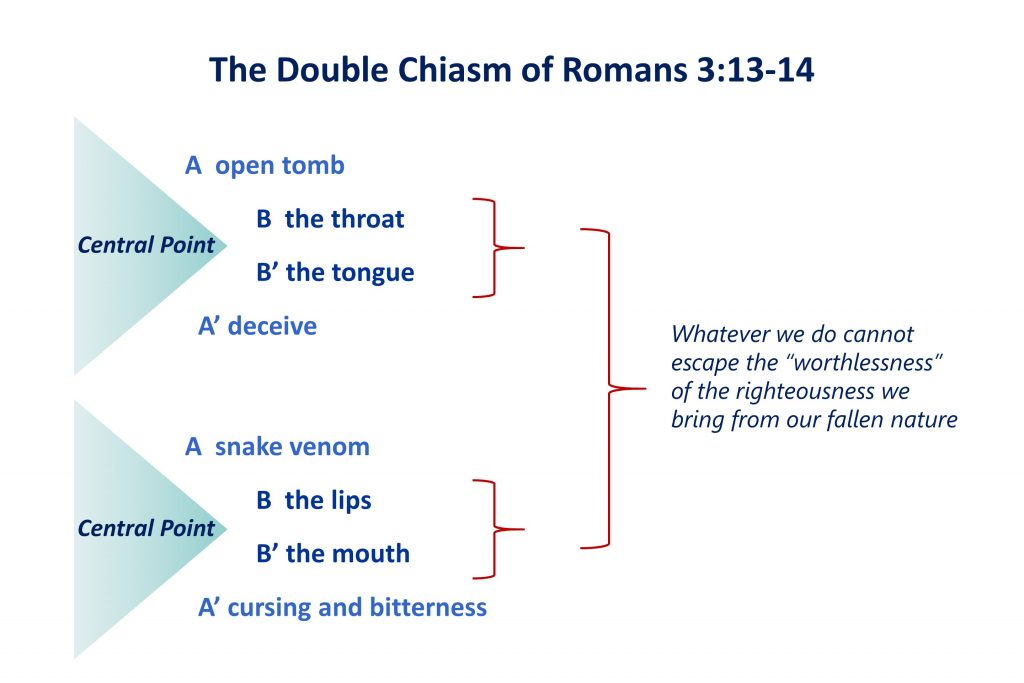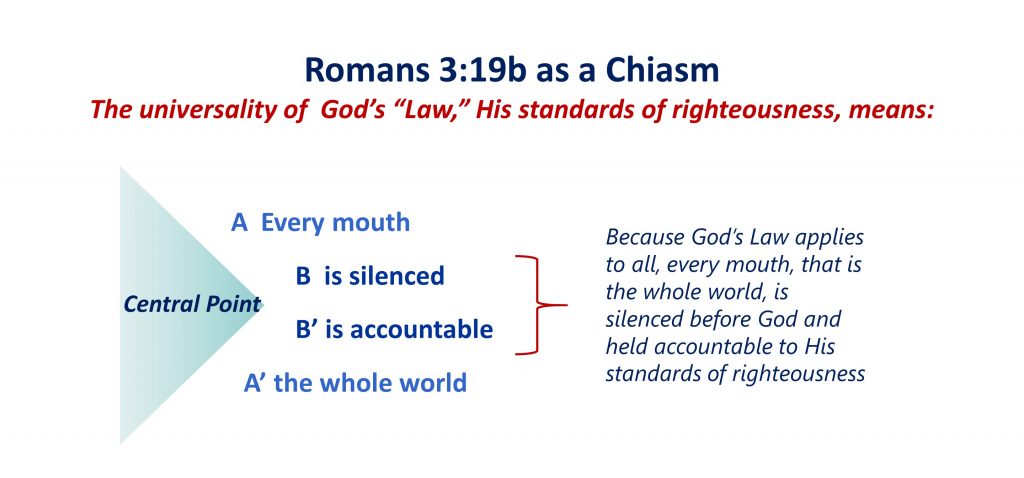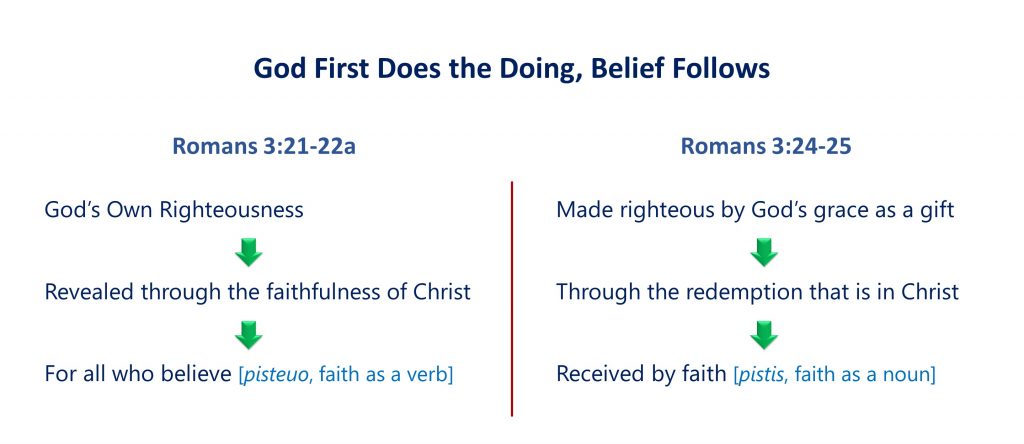 In Romans 3:1, Paul started focusing on the Jewish Christians’ sin of insisting on circumcision when Christ fulfilled it on the cross, then instituting His baptism. The Jewish Christians’ insistence reveals that a works righteousness had taken hold of them. They saw circumcision as their work for God (viewed from an Old-Covenant template) instead of what God did for them: bringing them into His Covenant.
In Romans 3:1, Paul started focusing on the Jewish Christians’ sin of insisting on circumcision when Christ fulfilled it on the cross, then instituting His baptism. The Jewish Christians’ insistence reveals that a works righteousness had taken hold of them. They saw circumcision as their work for God (viewed from an Old-Covenant template) instead of what God did for them: bringing them into His Covenant.
Despite their unfaithfulness, however, God is still faithful (Romans 3:4). So, how does one deal with this irony? Paul begins by focusing on the fruits of faithfulness: “righteousness.” Paul now shuts down an improper conclusion that one may draw based on God still being faithful despite our unfaithfulness.
God’s Righteousness; Our Unrighteousness
Read Romans 3:5
- What is the expected answer to Paul’s question?
Read Romans 3:6
- If God were unrighteous in His judgment of the world, how could He be a proper judge?
Read Romans 3:7
- When Paul wrote, “If through my lie,” what does that reveal about the accusations against him?
Nonetheless, Paul uses that accusation against him to make a point. Here’s his logic:
Proper understanding: Human failure (Paul’s “lying”) will work to show God’s righteousness.
Proper understanding: God will even use human sin to achieve His good ends.
Improper conclusion: God, then, is unrighteous if He punishes the sinner.
Read Romans 3:8
- If God is unrighteous when He punishes sinners (He’s not), what is an even crazier conclusion to draw?
- Paul is being sneaky. Whose sin is Paul addressing in this verse? (Rom 1:32, 2:24)
All People Are Under the Power of Sin
Here, Paul connects what he just said about God being righteous with a “what then.” This is standard rhetorical move for him (Romans 3:1, 9; 4:1; 6:1, 15; 7:7; 8:31; 9:14, 30; 11:7). He then transitions to the righteousness the person brings when it comes to God.
Read Romans 3:9-18
- What does Paul say five times in vs 10-12 and repeats, in conclusion, in vs 18?
- How unrighteousness is everyone based on his own “righteousness”?
- How does Paul show that someone cannot righteous on the inside if he is sinning on the outside?
Paul draws from many Old Testament passages to make his conclusion. He refers to these Old-Testament passages as “the Law.” Here, we see Paul transition in his use of the Law (from “Torah,” focused on the Jewish Christian) to mean God’s standards of righteousness for everyone.
| Masoretic Text | Septuagint | Romans | Paul’s Emphases |
| Ecclesiastes 7:20: There is none righteous on earth who does good and does not sin. | There is none righteous on earth who does good and does not sin. | Romans 3:10: There is none righteous, no, not one. | Paul focuses only on the inward state of being, not on doing “good,” which would distract from the main point. |
| Psalm 53:2-3: God looks… to see if there are any who understand, who seek God. Every one of them has turned aside; they have together become corrupt; there is none who does good, no, not one. | God looked… to see if there were any who understood or sought God. Everyone turned aside; they were all together worthless; there is none who does good, not even one. | Romans 3:11-12: There is none who understands; there is none who seeks after God. They have all turned aside; they have together become worthless; there is none who does good, no, not one. | Paul uses the Septuagint, which is stronger than the Masoretic Text. The MT has that we are “corrupt” (Hebrew, alach); the LXX has “worthless” (Greek, axreio). Not only is everything we do corrupted by sin—but because of our sinful nature, what we do has no righteousness before God. |
| Psalm 5:9: Their throat is an open tomb; they flatter with their tongue. | Their throat is an open grave; they use their tongues to deceive. | Romans 3:13a: Their throat is an open tomb; they use their tongues to deceive. | Again the Septuagint is stronger, which Paul quotes. The tongue doesn’t “make smooth” (Hebrew, chalaq, flatter) but deceives. |
| Psalm 140:3: Snake venom is under their lips. | Snake venom is under their lips. | Romans 3:13b: Snake venom is under their lips. | |
| Psalms 10:7: His mouth is full of cursing and deceit and oppression. | His mouth is full of cursing, bitterness, and deceit. | Romans 3:14: His mouth is full of cursing and bitterness. | Paul leaves out deceit, covering that earlier. Leaving “deceit” intact is not important to the chiasm Paul puts together here. |
| Isaiah 59:7-8a: Their feet run to evil… wasting and destruction are in their ways; they have not known the way of peace. | Their feet run swiftly to evil to shed blood…. destruction and misery are in their ways; they have not known the way of peace. | Romans 3:15-17: Their feet are swift to shed blood; destruction and misery are in their ways; the way of peace they have not known. | Paul again quotes the Septuagint. However, he makes a change at the end: He switches from oida (know) to ginosko (to come to know). Paul plants the seed of hope—even though you are under sin, God’s way of peace can still be yours. |
| Psalm 36:1: There is no fear of God before his eyes. | There is no fear of God before his eyes. | Romans 3:18: There is no fear of God before their eyes. | Paul switches to the plural to apply it to the congregation at Rome. |
In Romans 3:13-14, Paul’s word order weaves together a double chiasm: A sinful character trait is followed by the body part carrying out the sin. Because word order changes meaning more in English than in Greek, we lose the chiasm in our translations. Such rhetorical artistry from Paul is no accident.
Read Romans 3:19
- What in the context and in this verse show us that Paul’s use of “Law” does not mean “Torah” (limited to the Jews) but God’s standard of righteousness for everyone?
Read Romans 3:20
Psalm 143:2: Masoretic Text: No one living is righteous in your sight.
Psalm 143:2: Septuagint: No one living will become righteous before you.
Paul modifies Psalm 143:2, adding, “by the works of the Law.” The psalm affirms no one is righteous before God, which was something every Jew could affirm. The surprise was that no one will be righteous before God by “the works of the Law.” For the Jew then, that was how someone did become righteous before God!
“justified”: Greek, dikiao: The state of being righteous.
- Although what someone does may make someone righteous before people, what effect does someone’s actions have before God?
- What, then, is the purpose of the Law?
If the Law (God’s standards of righteousness) has no ability to make someone righteous to God, what does? This is what Paul answers next.
Someone’s Righteousness Before God
Paul closed down every notion that what someone does contributes to his standing before God. The obvious conclusion would now be, “Then why bother?!” Paul now explains why everything is not useless. He begins with, “But now,” showing that not all is lost!
Read Romans 3:21-22a
Excursus: “The Righteousness of God”
Does Paul mean “the righteousness that comes from God” or “God’s own righteousness”? Here, Paul means the revelation of God’s own righteousness. But how do we know?
Paul earlier dealt the issue of God’s righteousness in contrast to our unrighteousness, most clear in Romans 3:5. “But if our unrighteousness serves to show the righteousness of God, what shall we say?” “Righteousness of God” meant God’s own righteousness. Later, in Romans 3:26, Paul also refers to the righteousness inherent within God, by saying, “his [God’s] righteousness.
So, in the flow of Paul’s argument and his usage of “righteousness of God,” he means “God’s own righteousness.”
God’s righteousness and the righteousness that comes from God are not mutually exclusive. The righteousness that comes from God presupposes God’s own righteousness, a saving activity revealed to us in Jesus Christ. Jesus is God’s own righteousness!
———–
Excursus: “Through Faith/Faithfulness… Christ Jesus”
Paul now uses another phrase, which could mean “through faith in Christ Jesus” or “through the faithfulness of Christ Jesus”? Grammatically, either meaning is legitimate. How then does God’s own righteousness become the believer’s righteousness? Is it “through faith in Christ Jesus” or “through the faithfulness of Christ Jesus”?
As with “the righteousness of God,” the “faithfulness of Christ” and “faith in Christ” are not mutually exclusive. Those who believe in Christ do so because Christ was the faithful Son of God who died for their sins—and is the faithful Son of God who delivers His salvation to us!
Paul’s wording in Romans 3:21-22 favors “Christ’s faithfulness.”
But now, apart from the Law, God’s righteousness is revealed and is witnessed by the Law and the Prophets—God’s righteousness through the faithfulness of Jesus Christ for all who believe.
It doesn’t make sense to say, “faith in Christ” and then immediately say, “all who believe.” That’s redundant: “faith [Greek, pistis, noun] in Christ”; “all who believe [Greek, pisteuo, verb].”
God revealed His own saving righteousness through the faithfulness of His Son, Jesus Christ, for all who believe in Him. Our belief (faith) in Christ matters because Christ was first faithful, being the revelation of God’s own righteousness for us.
Paul’s distinction is important. He makes our salvation a result of God’s own righteousness (not ours) and Christ’s faithfulness (not ours). Because of what God has done and who He reveals Himself to be in Christ Jesus, we believe. Our salvation is not because we believe; we believe because Christ was, and is, the faithful revelation of God’s own righteousness for us. This keeps our faith, our belief, from being turned into our work for God. Paul will next affirm this understanding.
———–
Read Romans 3:22b-25
“propitiation”: Greek, hilasterion; the Greek term for “mercy seat.” Discuss.
- What is everyone’s situation before God? (vs. 23)
- How does someone then become righteous before God? (vs. 24-25)
Read Romans 3:26
Pastor’s translation:
… to demonstrate at the present time that he himself is righteous and the “righteouser” of those who have Jesus’ faithfulness.
- Why did God the Father, through Jesus, make His people righteous?
Click here to go to the next Lesson.




